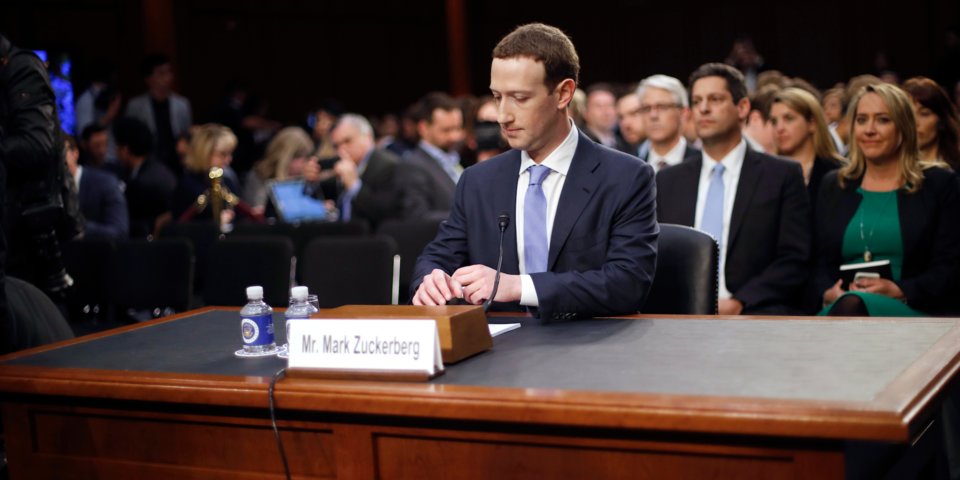| Facebook CEO Mark Zuckerberg just completed his two-day tour addressing US lawmakers’ questions regarding user privacy and data, among other topics. Some members of Congress used the hearings as an opportunity for a political sound bite, and Zuckerberg at times had to explain basic features and settings on the app. Overall, we believe the data and privacy updates Facebook pushed out in the weeks before the hearings gave Zuckerberg an arsenal of scripted responses to turn to for most of the questions asked over the two days. Here’s what brands and marketers should take away from the hearings: The user privacy controls Facebook is implementing to comply with GDPR in Europe will roll out globally — but affirmative consent may be different by region. There are two main facets of GDPR that Zuckerberg addressed in the hearing: offering privacy controls, and pushing affirmative consent for certain data. While the former will be pushed out globally, the latter may look different across the globe. To address affirmative consent, Facebook plans to put a feature at the top of the News Feed that walks users through their settings and allows them to update data and privacy controls. However, the settings that users are walked through for affirmative consent may differ by region, and they’ll likely be most comprehensive for European Facebook users. Facebook didn’t rule out a subscription model to opt out of ads, but a paid version is unlikely to come to fruition. The idea of offering a paid version of Facebook came up several times, and although Zuckerberg didn’t rule it out, he indicated the company will continue to push the free, ad-supported version. It’s highly unlikely that a subscription model would be rolled out because Facebook would have to charge high fees to recoup that lost ad revenue, especially in the lucrative US and Canada markets. Here’s a breakdown of how much ad revenue Facebook generated per monthly active user across the globe in 2017 (excluding revenue generated from Instagram and WhatsApp): - US & Canada = $82.44
- Europe = $26.94
- Asia-Pacific = $8.86
- Rest of World = $6.15
- Worldwide = $19.84
Facebook continues to deny it’s a media company, but agrees that it’s responsible for the content posted on its platform to a certain degree. In the past, Facebook has shied away from defining itself as a media company and curating editorial content. This means we’ll see Facebook take a more active role in determining the types of content that can be shared on the platform, especially when it comes to fake news and abusive content. Facebook is doubling its security and content review team to 20,000 by the end of the year, and aggressively investing in artificial intelligence to combat these problems, which will significantly impact its profitability. Regardless, established digital publishers will continue to struggle with distribution as Facebook works out privacy and data kinks on the user side. Regulation is inevitable, but will be gradual. Facebook has already committed to backing the Honest Ads Act, which requires disclosure of political ad information. Zuckerberg mentioned several times that the company is open to appropriate regulation. We think initial US regulation will be similar to what the EU has proposed with GDPR, but with specific nuances for the US market — especially around how data is protected. While Facebook users can control the content and data they share on Facebook, the company also has algorithms that predict interests based on what they like and share. We believe Congress will propose a bill that would allow users to choose what types of metadata and predictive modeling can be used to target them. Facebook will see little to no decline in US daily average users. Over three-quarters (77%) of Facebook’s US monthly active users access the app on a daily basis, and this daily habit of hundreds of millions of Americans will be a difficult one to break. While there will certainly be user backlash and “delete Facebook” campaigns, we believe the net impact on Facebook’s daily active user count will be muted throughout the rest of 2018. Brands aren’t going to significantly slow their ad spend on Facebook. While some advertisers may pause campaigns, we believe the impact on ad revenue growth in 2018 will be insignificant. The targeting capabilities on Facebook will continue to provide brand advertisers with high ROI throughout 2018. After all, Facebook has, and will continue to have, robust data on its members, even if third parties have restricted access. It could even make the data inside Facebook’s walled garden more valuable to brands since they wouldn’t be able to access information collected through third-party developers. | 
